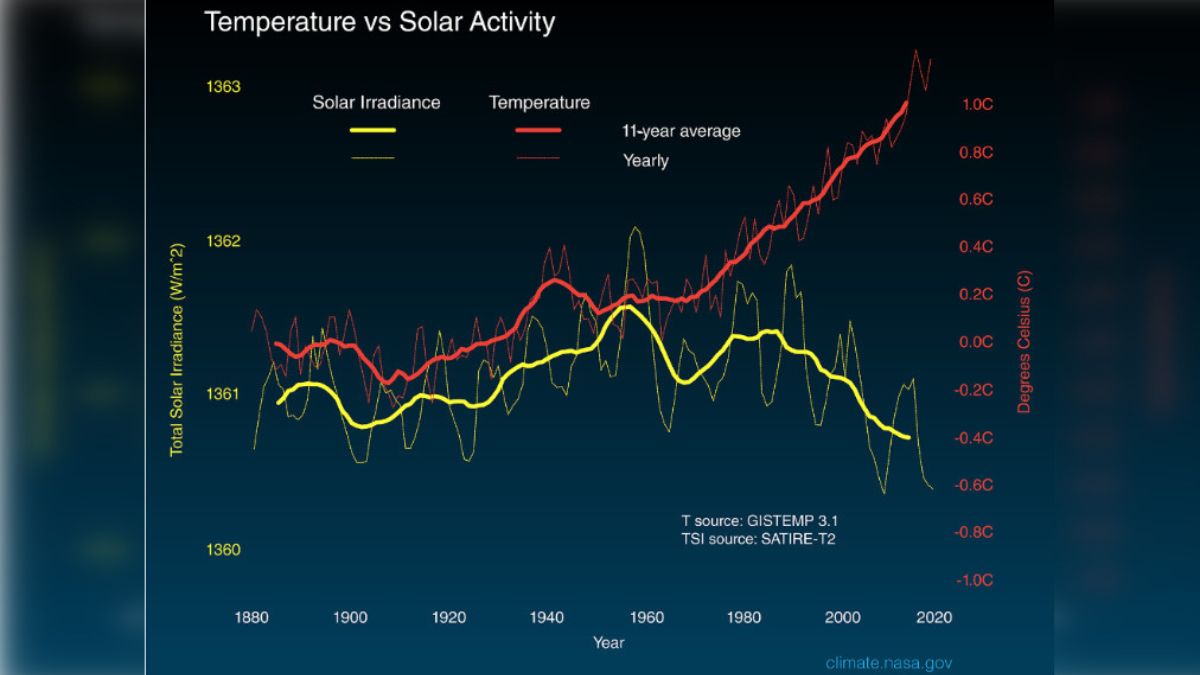Fact Check: 2024 Is Not Hotter Than 2020 Because Of The Sun Nearing A Solar Maximum
According to NASA, the solar cycle is the cycle that the sun’s magnetic field goes through every 11 years and the middle of the solar cycle is the solar maximum, or when the sun has the most sunspots.

The Verdict [Misleading]
The sun's solar maximum or active state causes negligible changes, and is not a “major reason” for rising global temperatures in 2024.
What’s the claim?
A Facebook user has claimed in a viral post that the year 2024 is hotter than 2020 because “the sun is currently in a more active state,” known as the solar maximum, as a result of which “increased solar radiation is contributing to higher temperatures.” The user further claimed that “this natural cycle of solar activity, combined with ongoing climate change, has resulted in noticeable temperature increases.” An archived link of the post can be seen here.
According to NASA, the solar cycle is the cycle that the sun’s magnetic field goes through approximately every 11 years, and the middle of the solar cycle is the solar maximum, or when the sun has the most sunspots. Scientists have confirmed that as of now, in 2024, the solar cycle is entering a phase of solar maximum, when the number of sunspots and solar storms reaches a peak.
Although increased solar activity during a solar maximum can disrupt radio communications and impact satellites and power grids on Earth, scientific data and experts confirm that these events have negligible impact on global temperatures.

Solar maximum and increased warming
Sarah Frazier, Heliophysics Communications Manager at NASA Goddard, told Logically Facts that the sun is now near its solar maximum. “Yes, the Sun is near solar maximum right now. The exact point of solar maximum will be determined later,” Frazier said.
When asked if the solar maximum is the reason behind the extremely high temperatures of 2024 compared to 2020, she directed us to a NASA article titled, "What Is the Sun’s Role in Climate Change?." According to this article, “the current scientific consensus is that long and short-term variations in solar activity play only a very small role in Earth’s climate. Warming from increased levels of human-produced greenhouse gasses is actually many times stronger than any effects due to recent variations in solar activity."
The article further stated, “Since 1750, the warming driven by greenhouse gases coming from the human burning of fossil fuels is over 270 times greater than the slight extra warming coming from the sun itself over that same time interval.”
Moreover, according to the United States National Science Foundation, there is only a 0.1 percent change in energy from the sun that reaches the Earth throughout the entirety of a solar cycle. This means that from solar minimum to solar maximum, the difference in energy actually reaching the Earth is minimal and not enough to lead to “noticeable temperature increases,” as the social media post claims.
Global temperature versus solar activity
NASA data on Earth's global surface temperature and solar activity from 1880 to 2020 reveals that while solar energy received by Earth has followed the sun's natural 11-year cycles without a net increase since the 1950s, global temperatures have significantly risen during this period. The numbers point to the fact that it is “extremely unlikely that the sun has caused the observed global temperature warming trend over the past half-century.”

NASA has further pointed out that for the sun to have been a major cause of rising global temperatures, there should be warming throughout the atmosphere. However, as warming is mostly at the surface of the earth and not at the higher levels of the atmosphere, this is consistent with the warming being caused by heat-trapping greenhouse gasses, and not the sun.
“An increase in solar irradiance would be expected to warm not only the surface and lower atmosphere but also the upper atmosphere. By contrast, enhanced greenhouse warming would be expected to warm the surface and lower atmosphere but actually cool the upper atmosphere. And this is exactly what we observe,” Peter Jacobs, a climate scientist at NASA's Goddard Space Flight Center’s Office of Communication, had earlier told Logically Facts.
However, it is true that 2024 has so far emerged to be the hottest on record, with "the year-to-date (January through May 2024) global surface temperature ranked as the warmest such period on record, 2.38 degrees F (1.32 degrees C) above average."
The verdict
The viral post is misleading because while solar activity like a solar maximum does cause changes to global surface temperatures, they are too minor and negligible to contribute to recent global warming trends. Research shows that greenhouse gasses, not solar activity, are the major cause of the current global warming trends.
(This report first appeared on logicallyfacts.com, and has been republished on ABP Live as part of a special arrangement. ABP Live has edited the headline and feature image of the report while republishing)





























